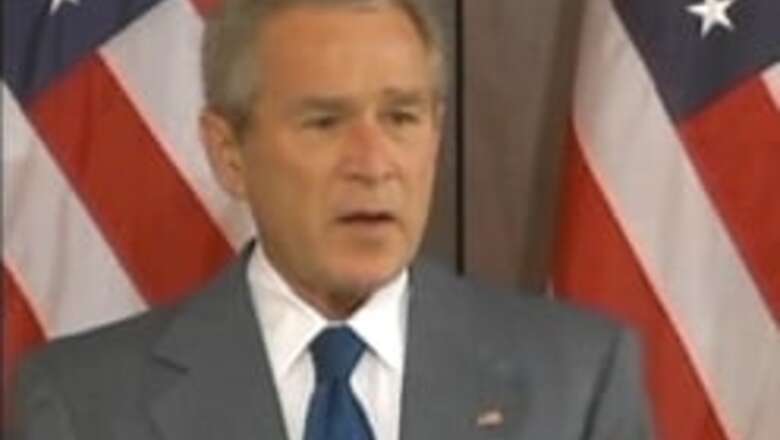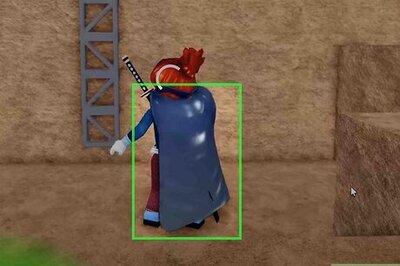
views
The Prime Minister has said the Indo-US nuclear deal may have got delayed but it’s not dead. The US has warned that the time is running out for India. The UPA has begun backdoor talks with Opposition parties to end the impasse but the Left doesn't seem amenable. What’s the fate of the nuclear deal? CNN-IBN Senior Editor/Anchor Dr Vidya Shankar Aiyar fielded questions from IBNLive readers in a chat on Thursday.
Akshar: I don’t understand what India is going to lose if the deal fails, but one thing we have certainly lost is our credibility. Why would the US or any other country trust India in the future? How does the Government save its face now?
Dr Vidya Shankar Aiyar: I am afraid I do not agree at all. The India growth story remains good, regardless of the deal. That’s the big advantage we have: our people, our middle class. That's not going to go away. Don't believe those who try and tell you our 'credibility' is lost. We didn't lose credibility when we tested in 1974. We didn't lose credibility when we had the Bangladesh War in 1971. We didn't lose credibility when we refused to give up on rights of the third world in the WTO talks on agriculture. We are not rescinding a treaty. We are simply not proceeding to have one. Thereby I am not urging we don't have one. I am merely pointing out that this argument of 'losing credibility' for having one is false.
Kallol: Somehow I get a feeling that though the Government is saying the deal is on hold, the reality is that they are tying up some loose ends with the IAEA and NSG before getting back on track. There is a clear impression of buying time. What do you think?
Dr Vidya Shankar Aiyar: Watch out for November 22 in Geneva, or early December.
Akshar: What change in USA’s stance can be expected if the ruling party in changes there? Will it be in India’s favour? Will a failed deal would create problem for Republicans while contesting the US Presidential el election?
PAGE_BREAK
Dr Vidya Shankar Aiyar: I don't know if you noticed but the German Chancellor was here a day ago. She was not singing like a lark on the benefits of the nuclear deal. Germany has several concerns she said, instead, on satisfying the non-proliferation agenda in the world that its partners in Europe have. I don't believe in the NPT. I do believe it is unequal. And I believe it is not sustainable. However, right now we are affected by it, and this deal is a way out, though not the best way out.
Sundars: If deal is not re-negotiable and the Government says it wants to win over Opposition or supporting parties, what is that it Government can offer as compromise?
Dr Vidya Shankar Aiyar: Sense of the House resolution. No matter which way you look at it, we are heading for one, with or without a vote. Of course, it may not be a ‘resolution’. It may be a statement made finally by the PM at the end of the debate. By the way, Condoleeza Rice did NOT say the deal is non-re-negotiable. How can anyone say that? It may be difficult, but not impossible. Thirty years ago, this deal would be considered impossible to have. Who is to say what a new administration will do? No one predicted what Bush was going to do with India.
The problem is there is a deliberate impression being given by some in the PMO and powers that be who advise the government, that this is a now or never opportunity. I think this bluff needs to be called. It's a good opportunity ONLY because we have a US President backing it. Why don't we go out and say that? Instead of which, we say the deal is non-re-negotiable.
Badrinath: Is the primary sticking point the implications of the Hyde Act? The Left calls the Hyde Act as determining India's strategic subservience to American interests, while the Right terms it a cap on India's strategic weaponisation interests. Notice that the Left’s objections to the deal on “ideological” grounds appeared first primarily after the Hyde Act was passed (it had supported the steps taken by the PM after his nine-point assurance).
PAGE_BREAK
The Left’s harping of other issues including the Defence Framework Agreement, the Logistics Support Agreement and the Proliferation Security Initiative all contribute to the same thing: the context and text of the deal hurting India's independent foreign policy. In essence, does the government have any plan of mitigating these concerns that stem from the Hyde Act? If so, how?
Dr Vidya Shankar Aiyar: That’s where a new ‘sense of the House’ resolution in Parliament’s winter session comes in.
Sandeep Patalay: Don't you think that accepting the deal will act as an obstacle for our indigenously developed thorium based reactors. I say this since our scientific community may put it on back burner as readily available technology would be in our hands.
Dr Vidya Shankar Aiyar: Not just our scientific community, also the government of the day. The scientific community too needs to accept the blame for the poor state of nuclear energy generation in this country. But the government too is to blame. This deal, for all its benefits, is not among equals.
Thomas: Other than buying some fuel for our nuclear reactors, is there anything more to the deal in terms of transfer of new technologies?
Dr Vidya Shankar Aiyar: That's still debatable and depends on other agreements, but it certainly unlocks the possibility.
Satyanshu: If the deal is not operationalised, will it be a big blow to India?
Dr Vidya Shankar Aiyar: Certainly not! Not by a long shot. It might be a minor temporary setback at worst.
Satyanshu: What do you think should the government do at this stage? Go on with the deal for the future of the country or forget about it just for mere power? What will the Congress party do?
Dr Vidya Shankar Aiyar: I think this choice is a creation of the media. The Congress is going ahead with a plan that has not changed much since its dialogue with the Left began. The Left has reiterated several times that it is not interested in voting this government out. Not yet. Then why meet UNPA members? What is this 'floor coordination'? Why meet DMK in Chennai? Here's the plan: debate in Parliament. Let a general resolution come out that can be abusive of the deal or the US or critical of the government but let it be without a vote.
PAGE_BREAK
The government can step down through a cabinet decision that recommends early elections or a vote in Parliament not led by the BJP. Will the parliament be allowed to function? I think so.
Dr Vidya Shankar Aiyar: Close ties with the US started developing during the NDA government and if NDA were in power they would have signed the same N-deal. Why is the BJP not supporting the deal now?
Dr Vidya Shankar Aiyar: I think efforts are on to get them on board so that they too have a sense of ownership on this deal. I think, more than the nuclear deal, the government has struck a deal with the Left. Let's have a sense of the house resolution, much like the Sense of Congress stuff in the Hyde Act that is non-binding and we will not press for a vote on it. If need be, all the caveats can be added in a resolution that will cater to the criticisms of the left and the BJP. After all, Parliament can easily assert its right to test a million times!!
Anil Shah: What are the implications of accepting or rejecting the nuclear deal?
Dr Vidya Shankar Aiyar: If we accept, we will get very close to the US. That is unmistakable, whether or not we buy a single US reactor. Is that good for us? That's debatable. If we reject it now for reasons of a 'lack of consensus in parliament', then it's certainly not the end of the world either. All talk of India suffering internationally, with its credibility being hit, are grossly exaggerated. The India growth story is a good one, regardless of the deal. There is going to be no appreciable negative impact.
Shankar: I as a common man ,can't understand what is this deal all about. What is the deal? Who is it going to benefit? Has Dr Manmohan Singh enough expertise in making such deals with a country like America?
PAGE_BREAK
Dr Vidya Shankar Aiyar: I would trust Manmohan Singh. I would not trust all those advising him though. I think the whole nuclear deal question has been badly managed in the media. A good deal, in terms of the bilateral 1-2-3 Agreement has been overshadowed by a lot of cloak-and-dagger stuff, plus an image that India is towing an American line. Also, in the utter indiscriminate way in which we use the word 'strategic' for relations with nearly every country on the planet, we have laid bare that we do not have a strategic vision for India.
R Sundaram: Will you place your bets on operationalising the deal by March 2008?
Dr Vidya Shankar Aiyar: Quite likely. However, can't rule out yet it happening later in 2008. We need to wait for the Left Politburo meet on November 11 and 12.
Vinod R. Krishnan: My question to you is from the viewpoint of a common man in India. Will this deal will benefit us or not? If it benefits in what term and if not why. Most of the Indians belonging to the middle class sector here in Bahrain believe it’s not in the safe interest of India to go ahead with the deal. Would that prove dearly to our country?
Dr Vidya Shankar Aiyar: It's good to go ahead if there is complete political backing in this country. This is not going to remain a business deal alone. So, it's important to understand its repercussions. Let's put it this way this deal will help achieve something for India. It may not be the best way though. And catch is, it's not possible to say when next we will have a better opportunity. So, do you want to cash in now, or wait for a better time?
MMX: I do not understand the term operationlise.
Dr Vidya Shankar Aiyar: :) Nor do most people. I think it is a word that has come to mean leave the agreement on paper.
Manoj: Will the next US President accept a revised re-negotiated civilian nuclear deal? What's your take on this?
Dr Vidya Shankar Aiyar: It's possible. Why not? The question is... do you want to take that chance then or now when you have a president who is willing to completely back it. And you can't top a president in the US when it comes to getting things done...
Tanveer: Why does the government not come out loudly with the fact that its not an Indo-US but an Indo-world deal? Is there no alternative way like negotiating with the NSG directly rather than going through the US
Dr Vidya Shankar Aiyar: Good question. Why do we need this deal to ease our way into the world nuclear commerce? We need the NSG to move... Now that group takes all its decisions unanimously. Hence, the US needs to be on our side there. The US can only be on our side if it changes its domestic laws... or if another international instrument is created that replaces the nomenclature of the NPT, the non-proliferation treaty, according to which, India is not a nuclear weapons state. Is that possible... Yes, it is.. but not in the near future. Consider that men like Kissinger and several other top former US officials have already expressed their opinion now for the first time on the unsustainability of the NPT caste system. However, the Ayotollahs of the non-proliferation lobby wield a far greater influence for now.
Arnab Mitra: Is the N-deal part of a larger plan of ushering in an arc of democracy in Asia? Should India play this game to checkmate China?
Dr Vidya Shankar Aiyar: The nuclear deal is a business proposition. Nothing more. We can choose to make it strategic, but that depends on how well we play the business and scientific game. We have lived without the deal for 3 decades. Why do we need THIS deal to restore the inequity? There is a sense the government has conveyed about how 'if not now, then never' over this deal, which is grossly exaggerated. Without taking away from the importance of this deal, it is equally true that it is indeed not the end of the road by a long shot for India on the global scene. China will remain a competitor no matter what. And it has a head start over India in building nuclear reactors for energy. We will never be able to catch up, with or without the deal.
Prashant Rukmangad: There is no point in having a planned debate in Parliament as nobody listens to anybody. Why don’t Prakash Karat, the PM and Sonia Gandhi discuss and finalise the decision?
Dr Vidya Shankar Aiyar: Good point. There is too much cloak and dagger in this deal. Why did the PM send a cryptic note from Nigeria on his conversation informing Bush of 'certain difficulties'? There were six paras on the Doha round of the WTO and just 2 and a half lines on this conversation, and that too without it mentioning what was Bush's response? Why? It wasn't a careless oversight, surely. It only indicates the 'plan' the government is working on.
AA: Hello there, a very good afternoon to you. What stand do you think BJP will take after the spate of meetings they've had with US officials and with the PM? Do you think they'll at least abstain from voting if it comes down to that in Parliament? And secondly what do you think is India's interest?
Dr Vidya Shankar Aiyar: You know, what is going to happen in Parliament is the enactment of a drama that is being pre-scripted as far as possible. The meetings of US officials with the BJP is a part of it. An element of uncertainty will remain, depending on what actually transpires in parliament. The whole point, in Prakash Karat meeting members of the UNPA and the DMK is to try and avoid a vote on the issue. And if a vote is brought on, then that needs to be a non-BJP sponsored vote, such as one brought on by the UNPA, so that the left will not have a problem backing it. The BJP too may avoid a vote. I will expand on this them in this chat.
Lohith: What could be the negative impact if India signs the N-Deal, as America supports Pakistan first and then India?
Dr Vidya Shankar Aiyar: Not sure I agree that Pakistan comes first for America before India, but appreciate the concern regarding that. The greatest plus in this deal is that it will lead to a change in the rules of nuclear commerce by changing rules of engagement of the nuclear suppliers group with India. The greatest negative. Well that depends—will a future Indian government remain committed to its own stated goal of nuclear independence and proceed with the Thorium route to producing nuclear energy? Or will it simply get too cosy with the Uranium route? And that has a spill over effect on the cost of electricity that may then go up.




















Comments
0 comment